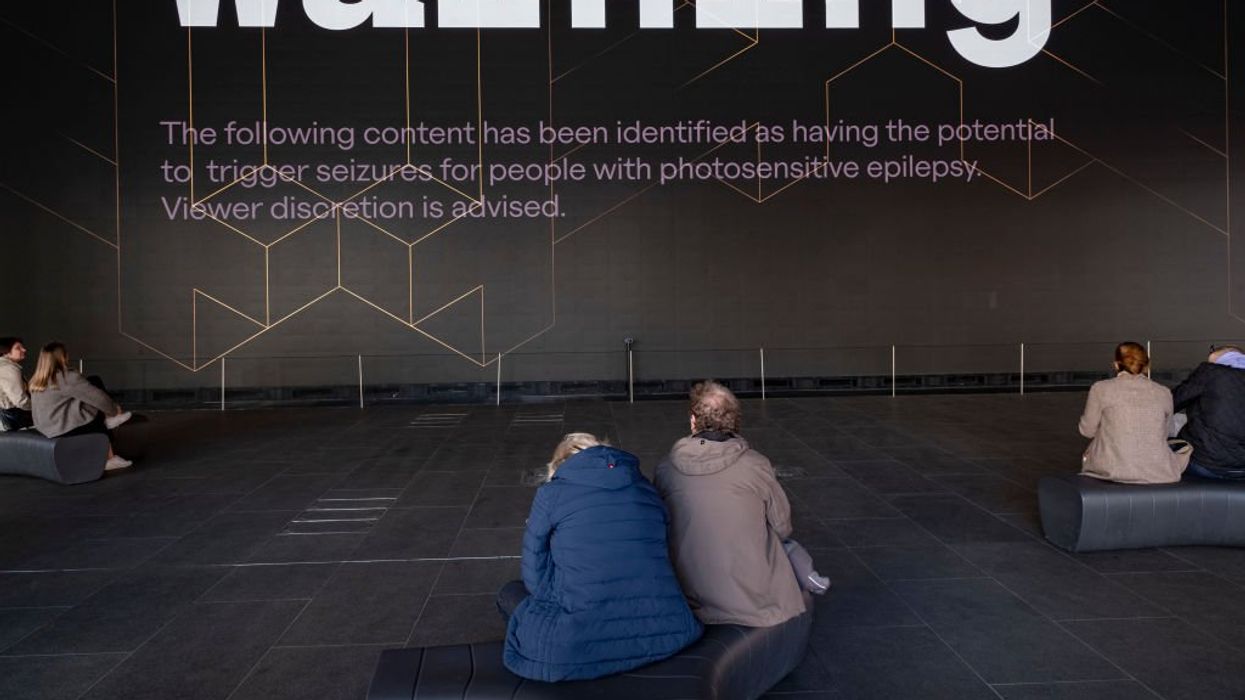
Photo by Mike Kemp/In Pictures via Getty Images

Streaming services seek to avoid 'trauma' when shows depict sexual or violent scenes.
Despite trigger warnings increasingly spoiling the stories of shows and movies, entertainment and streaming companies only seem to be widening the net of themes that require advanced warning.
The industry seemingly reached maximum parody with the latest trigger warning for 1990 crime classic "Goodfellas." The message warned viewers that there were Italian mobsters in a movie about the Italian mob.
"This film includes language and/or cultural stereotypes that are inconsistent with today's standards of inclusion and tolerance and may offend some viewers," the message read.
Warnings about stereotypes or offensive material are ever-present, but notifications about trauma-related triggers for TV shows have become even more detrimental to the user experience. In effort to prevent a sensitive viewer from experiencing any form of slight discomfort, trauma warnings have actually ruined the plots of many episodes.
As Variety reported, Netflix's "Baby Reindeer" gave away that a sexual assault scene was coming with a warning that read "the following episode contains depictions of sexual violence which some viewers may find troubling."
For viewers of a popular series, it's fairly easy to predict what the content warning is referring to when it can easily be connected to a character's story arc.
An international streaming service called Stan foreshadowed a suicide in "Better Call Saul" with a hotline number. Apple TV+ did so similarly by warning viewers about "a depiction of self-harm" in the show "Severance."
'When you give a trigger warning you're validating a person's feelings about getting offended.'
Suicide and sexual assault are the top reasons for applying warnings before content, but even if it comes at cost of the plot, many industry members just don't care.
John Whipple, founder of "Does the Dog Die" said that he doesn't care if he ruins movies. "I Spoil Movies and I’m Proud of it" the latest article on his website read.
Whipple said his data makes it obvious that there is an unmet need for very specific content warnings for all forms of entertainment.
Colleen Clemens, the director of women’s, gender, and sexuality studies at Pennsylvania’s Kutztown University, told Variety that while trauma and discomfort have started to become "conflated," she still supports trigger warnings.
"I appreciate a TV show that says at the beginning that it depicts sexual violence," she told the outlet. "That's great, thank you for telling me. I can now make a decision if I feel like I could watch that right now."
Clemens even wrote a piece in defense of trigger warnings for the Southern Poverty Law Center in 2016.
She described trigger warnings as a way to avoid memories of trauma. She even noted that she has given verbal trigger warnings when teaching at a high school, and even to adults in a university setting.
"I do not see the act as coddling. Rather, I see it as an act of nurturing," Clemens said.
Stand-up comedian Leonarda Jonie sees it quite differently.
'Now trigger warnings are broadened to include nonsensical gender identification, safe spaces, and even warnings of 'trans-misogyny.'
"The whole reason for trigger warnings is because people are being coddled. They're told that they're not responsible for their own feelings, that it's someone else's fault."
"When you give a trigger warning you're validating a person's feelings about getting offended," Jonie continued. "It's telling them they should be offended and it fuels their self-righteous attitude."
No type of content seems to be safe from such warnings, which in many cases, have turned into a way for activists to voice their own political opinions before a viewer/user has the chance to consume the content.
In early April 2024, it was revealed that a board game based on the "Tomb Raider" video game contained a scathing review of the game's main character. The game described it's own lore as "colonialist" and condemned the title character for being a person who steals from tombs.
Melissa Carter, showrunner for both TV shows "The Cleaning Lady" and "Queen Sugar," said she felt trigger warnings act as an "extra guardrail" for young viewers.
"A [trigger warning] could at least prepare them for something that's personally upsetting to them," she said.
Commentator Lewis Brackpool believes that is no longer the truth.
"Trigger-warnings used to be about warning parents and viewers of any graphic imagery with regards to distressing content. Now trigger warnings are broadened to include nonsensical gender identification, safe spaces, and even warnings of 'trans-misogyny,' which is an oxymoron within itself," Brackpool explained.
"I’d advocate to go back to the 1990s trigger warnings to which it served a solid purpose."
With numerous Disney classics and even James Bond movies receiving trigger warnings as of late, industry insiders continue to state that the warnings are here to stay. Streaming services have seemingly decided that avoidance of discomfort or potential trauma trumps the overall user experience.
There may be somewhat of a compromise available, however. An example being the CBS show "Ghosts," which posted a warning on its Facebook page while still attempting to be mindful of spoilers.
"Tonight's episode deals with sensitive subject matter. … We won't go into detail as not to spoil the episode, but we will share support resources."
Like Blaze News? Bypass the censors, sign up for our newsletters, and get stories like this direct to your inbox. Sign up here!
Andrew Chapados